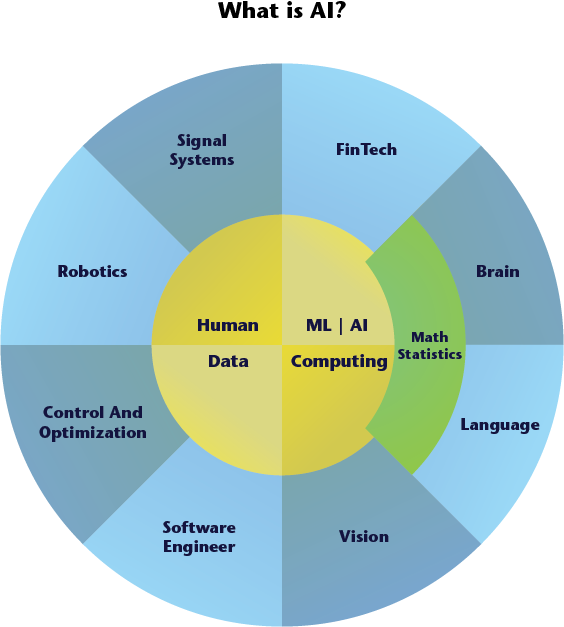
M.S. in Artificial Intelligence
Join the Computing Revolution. An intellectually exciting, highly creative and high impact pursuit. AI is data science. AI + X is transforming virtually every part of the modern global ecosystem.
- AI + Chemistry: Protein Folding Nobel Prize in Chemistry 2024
- AI + Personalized Medicine
- AI + Physics: Nobel Prize in Physics 2024
- AI + Neuroscience
- AI + (Your Innovation Here)
** Credits earned in the Certificate in Artificial Intelligence may be applied to the M.S. in Artificial Intelligence
Apply Now | Request Info | View the AI brochure
This program is also available at Jersey City.
MS in AI: A Multidisciplinary Pathway 10 Courses
Close AllExpand All
- MATH 662: Probability Distributions
- DS 644: Introduction to Big Data
- DS 675: Machine Learning
- or CS 670: AI
- One of:
- DS 669: Reinforcement Learning
- DS 677: Deep Learning
- DS 680: Natural Language Processing
- DS 683: Graph Neural Networks
- DS 789: Trustworthy AI
Sample electives. For a full list, visit our catalog.
- Data Science
- DS 669: Reinforcement Learning
- DS 688: Advanced Federated Machine Learning
- Computer Science
- CS 681: Computer Vision
- Statistics
- Introduction to Biostatistics
- Robotics
- ME 625: Introduction to Robotics
- BME 676: Computational Biomechanics
- BME: Modeling in Func Brain Imaging
- Engineering
- BME 661: Neural Engineering
- CE: Remote Sensing of Environment
- MTEN: Machine Learning for Chemical and Materials Engineers
- Science
- BIOL 635: Intro to Comp Neuroscience
- BIOL 638: Computational Ecology
- CHEM 716: Integrated Drug Dev & Discover
- CHEM 737: Applications of Computational Chemistry and Molecular Modeling
- Business and Management
- FIN 616: Data Driven Financial Modeling
- MGMT 735: Deep Learning in Business
- ACCT 640: Big Data Analytics for Accounting
- DS 700B: Master’s Project
- DS 701B: Master’s Thesis
To be eligible for admission, a student must have a Bachelor of Science degree with a minimum GPA of 3.0 on a 4.0 scale and have completed the following undergraduate coursework:
- Calculus I and II (equivalent to the NJIT courses Math 111 and Math 112)
- Introduction to Programming (equivalent to the NJIT CS 100 course)
- Basic programming constructs, writing and debugging programs, iteration, recursion, arrays, lists (equivalent to NJIT CS 113)
- Data Structures and Algorithms (equivalent to the NJIT CS 114 course)
- Probability and Statistics (equivalent to the NJIT Math 333 course)
- Linear Algebra (equivalent to the NJIT Math 337 course)
Students who do not meet all of the above requirements but hold a BS or BA degree in a technical scientific subject will be evaluated on a case-by-case basis and may be admitted to the program after they successfully complete a relevant graduate certificate in Artificial Intelligence, which provides a pathway to the MS program. Earning the certificate with a GPA of 3.0 or higher guarantees admission to the MS program.
All applicants are required to submit:
- Transcripts from a prior degree in computing
- At least one letter of recommendation
- GRE
- TOEFL, or IELTS, or Duolingo
Students who receive a master's degree in AI from NJIT will be able to demonstrate their expertise in the following areas:
- Design and build custom AI models using a general-purpose programming language (Python) and frameworks such as Tensorflow and PyTorch.
- Design and develop software in the form of scalable AI software architectures and APIs.
- Process and analyze a variety of data in different formats including text, images, audio, videos, and time series data.
- Formulate complex problem statements and solve them using specific AI models.
- Present AI applications and methodologies effectively and clearly.
Campus Options
- The online program is available to both U.S. residents and international students
- The online rates are available only to students fully enrolled to the online program
- U.S. residents can choose a combination of face-to-face and online courses
- The Jersey City program is not available to F-1 international students
- F-1 students can take at most one course per semester online, or at Jersey City
- Online: $34,290
- Jersey City: $34,504-$37,200
- Newark, NJ residents: $36,426-$46,450
- Newark, non-NJ residents: $44,748-$63,120
All applicants are automatically considered for financial support during admission, with no need for additional communication. However, guaranteed financial support for MS students is limited and typically reserved for doctoral candidates.
After enrollment, MS students can apply for campus jobs such as grading, tutoring, research assistantships, or roles in the library and academic departments to help offset expenses.
Well-performing students are often hired as graders, earning up to $9K annually.
